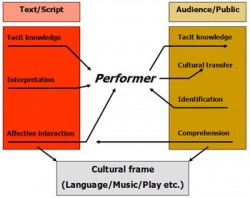According to Lorin Schwarz, arts-informed research "holds within it an imperative not only to question its own completeness and objectivity, but also to 'speak back' to forms of authority that have traditionally silenced and left out voices that either don't fit, refuse to offer a definitive answer or that demand emotional knowing in order to understand what they feel compelled to say" (29). Schwarz, in her article "'Not My Scene': Queer Auto-Ethnography as Alternative Research Method." argues that research can benefit from this type of methodology.
How does one reflect on something as profound and somewhat mind-boggling as the concept that some topics are enhanced by this type of methodology? When I contemplate this method, I envision this diagram that I found online:
With this type of research, things that would otherwise be left unnoticed are brought to light: the "human" elements that are not, scratch that, NEVER black and white. Schwarz argues that this type of research "provides a critical foundation to question the structures we take for granted in often unexamined dualisms of 'black and white' thinking" (29). Humanity, when viewed as black and white, becomes this rigid, unbending thing that breaks when the slightest pressure is put on it. This type of research allows the researcher and the audience to see things in shades of gray.
Schwarz demonstrates her arts-informed research with a play. A one man act that explores what one man feels when he sees other happy gay men together. This is the type of auto-ethnography that perhaps no other type of research can get at at this depth. Some of the passages get at the depth of human existence in a way that regular, black and white, research never could.

 RSS Feed
RSS Feed

